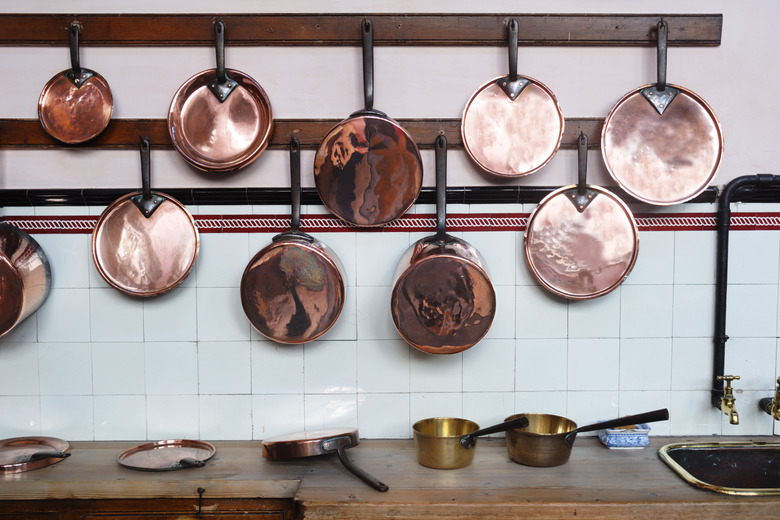Why Copper Pots Turn Black
Copper is in vogue at present both for its aesthetic appeal and its excellent performance in the kitchen. Copper is a great conductor of heat, which means you can make professional-level meals in your home kitchen. Copper cookware does require a certain level of care, however, or it may turn black over time. Fortunately, you should be able to clean your copper cookware and remove the black marks with relative ease.
Oxidation of Copper Cookware
Oxidation of Copper Cookware
The reason that copper pots and pans turn black over time is that the copper oxidizes. This is a chemical reaction that is completely natural and causes a dark brown or black layer when you heat your copper cookware. Technically, this layer is copper oxide.
If you don't clean the pots and pans once copper oxide has settled, it will ultimately turn into copper carbonate in the air and become green. (This is a more commonly known side effect of copper oxidation, thanks to landmarks like the Statue of Liberty.)
Unfortunately, this issue is more than just aesthetic. Oxidation of copper actually limits its heat conductivity, so the ability of your pots and pans to cook well will be impacted if you don't properly care for your copper cookware.
Removing Copper Vessel Black Spots
Removing Copper Vessel Black Spots
To remove black spots inside a copper jug or pan and restore your cookware's beautiful copper color, you will need to take care of them by regularly cleaning and polishing them. Avoid the use of harsh chemicals or rough sponges and steel wool in your cleaning. In addition, never put copper cookware in the dishwasher.
To remove existing black spots, you can use a store-bought copper polish. Follow the instructions as outlined by the manufacturer, which will likely tell you to apply the copper polish with a soft cloth. Then, clean the cookware with water and gentle dish soap before use.
If you would prefer to avoid the use of chemicals on your cookware, you may also try a paste made of equal parts vinegar, salt and flour. According to Mr. Maid, a vinegar and salt mixture is a "slightly aggressive" method, but fairly gentle and all-natural. Gently apply it to your cookware and scour the spots until they begin to disappear. When you've finished, wash the pots, pans or jugs in hot, soapy water to get them clean.
Copper Cookware Basics
Copper Cookware Basics
When using copper pots and pans, you should be aware that it may react with acidic foods. This means if you cook pasta sauce or make jam using lemon juice, you'll need to be sure to clean your copper cookware right away to avoid damage.
Most copper pots are lined with other metals, like silver, tin, stainless steel or nickel. It's essential that your copper cookware is lined because unlined copper is actually harmful to humans if ingested.
Each metal lining type performs slightly differently in the kitchen, with silver being more expensive and tin tending to be unable to withstand high temperatures. Nickel is a good choice because it is a good conductor and more durable than tin. Stainless steel is also an excellent choice, though it doesn't conduct as well as nickel.
